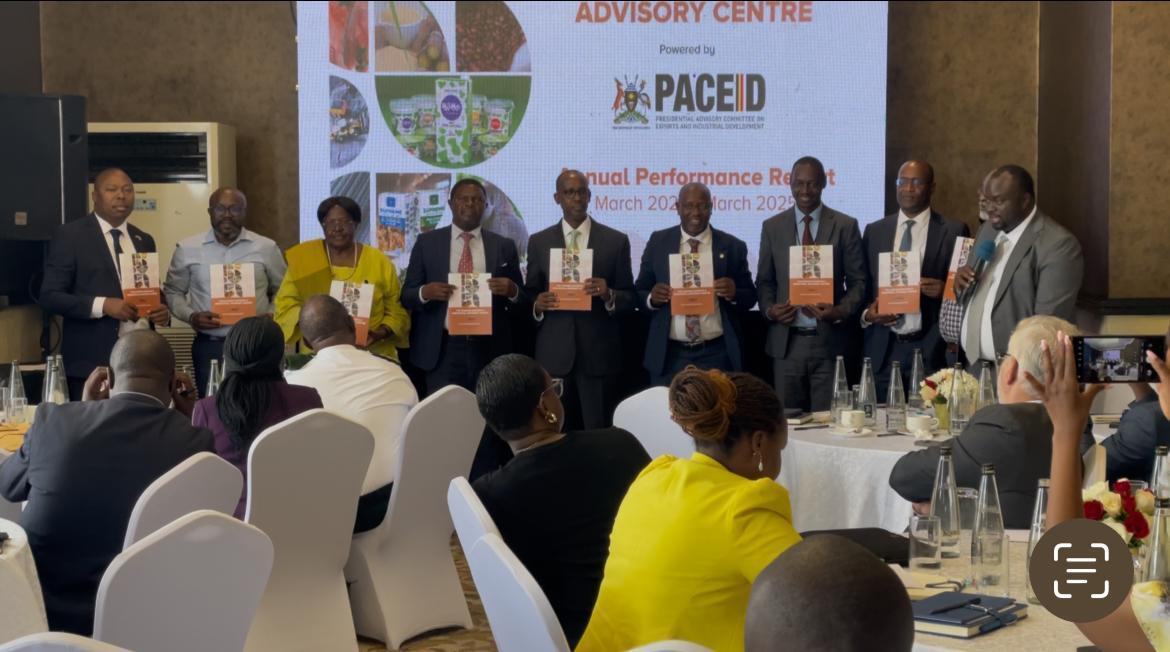Africa-Press – Uganda. The Chairperson of the Presidential Advisory Committee on Exports and Industrial Development (PACEID), Adrek Rwabwogo, has urged Uganda to adopt a unified export strategy, warning that fragmented institutional efforts risk undermining recent gains in international markets.
Speaking at the launch of PACEID’s third Annual Performance Report in Kampala, Rwabwogo praised the country’s growing visibility in high-value markets such as the Middle East and the COMESA region but cautioned that uncoordinated action could blunt momentum.
“Every product has a language around it, and that language creates meaning and culture. We must begin to develop one code of language understood by all,” Rwabwogo said, highlighting the need for alignment across ministries, standards bodies, and private sector actors.
The 2024/2025 report is framed around four pillars—Markets, Infrastructure, Standards, and Finance—highlighting rising global demand for Ugandan fish, avocados, tea, honey, eggs, and beef.
According to PACEID, these sectors could generate billions of dollars in export revenue if backed by stronger coordination and investment in infrastructure such as aggregation centres.
Dr. Peter Ngatigije from Uganda EXIM Bank, which has injected more than Shs10 billion into export support in its first year, said Uganda could shift from low-value commodities to high-value exports like fish and pork through economies of scale and targeted financing.
“We are known for producing low-protein products. But with scale, we can shift to high-value exports like fish and pork,” Dr Ngatigije said.
Rwabwogo emphasised that exporting is not just about producing goods, but about understanding global standards and responding to market expectations.
“Without aggregation centres and enforceable standards, we won’t meet the rising market demands,” he said, warning that lack of infrastructure and cohesion could choke supply chains just as global demand begins to favour Ugandan products.
Among the key priorities for the upcoming financial year are raising external capital, expanding Uganda’s presence in new markets, securing beneficial trade agreements, and improving data collection to guide policy decisions.
Representing the Minister for the Presidency, Under Secretary Dan Ssekiboobo hailed PACEID’s progress as evidence that visionary policymaking can work.
“You have not embarrassed us. This is a tangible idea in the country’s development,” said Ssekiboobo.
“We commend your efforts in understanding difficult markets and building export networks. The diaspora engagement and mentorship potential is something we should all support.”
Other officials echoed the call for system-wide reform. Uganda Revenue Authority Commissioner Asadu Kigozi Kisitu advocated for a one-stop centre for exporters to reduce red tape, while Uganda Airlines announced a new cargo route to London starting May 18, aimed at meeting surging demand for fresh produce exports.
Rwabwogo closed the event with a stark reminder that Uganda’s export ambitions hinge on unity of purpose.
“Markets must inform your standards, and standards must shape your systems,” he said. “If we don’t coordinate, one sector will succeed while another fails.”
The release of the 2024/25 report comes at a pivotal moment, as Uganda intensifies its efforts to transform agriculture-led growth into a robust export-driven economy.
As the country chases new markets, Rwabwogo’s call for unity may determine whether Uganda’s exports rise collectively or falter in silos.
For More News And Analysis About Uganda Follow Africa-Press






